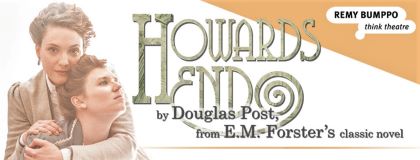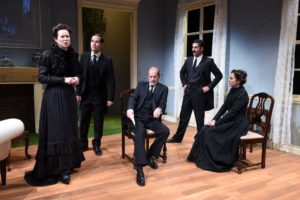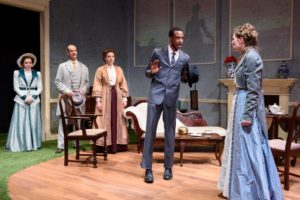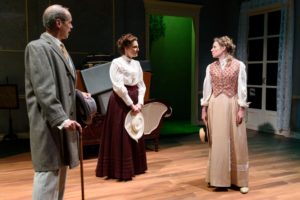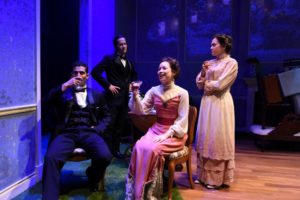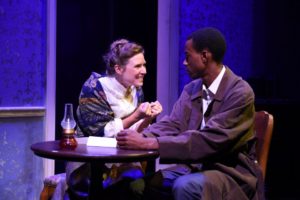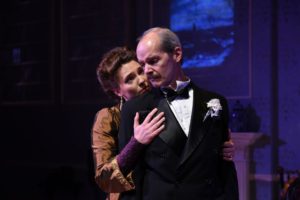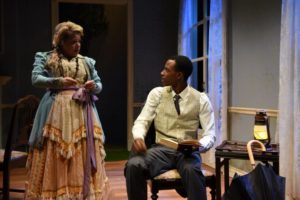MAY HOWARDS END NEVER END
“Only connect..! Only connect the prose and the passion, and both will be exalted, and human love will be seen at its height. Live in fragments no longer.”
Seldom has a classic novel so strongly followed its defining drive as Howards End, E.M. Forster’s seminal 1910 good-will offering. As seen and felt between 1908 and 1910, three disparate English families testify to the imperative of change and to humankind’s mutual responsibilities. Forster breaks down and drives home seemingly imponderable abstractions by delivering a plot that, well, not only connects but fuses good intentions with unintended consequences, false pride and dogged prejudice, and smug success versus socialist conscience-keeping.
Like the three equally different families in Ragtime, these not-so-loved ones will end up progressively interconnected, class distinctions bending before the moral growth of nobler purposes. If the good deeds done here don’t go unpunished, the bad ones fully earn their reckonings before Forster’s sad but satisfying ending.
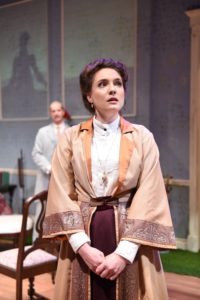 It’s all present and accounted for in Doug Post’s adaptation, a commissioned world premiere from Remy Bumppo Theatre Company at Theater Wit. Marvelously mixing playfulness and earnestness, director Nick Sandys and nine actors register the novel’s memorable encounters, getting the surfaces right even as they plumb the depths.
It’s all present and accounted for in Doug Post’s adaptation, a commissioned world premiere from Remy Bumppo Theatre Company at Theater Wit. Marvelously mixing playfulness and earnestness, director Nick Sandys and nine actors register the novel’s memorable encounters, getting the surfaces right even as they plumb the depths.
The first family we meet, mourning their marvelous mother Ruth, is the elaborately established Wilcox clan — patriarch Henry (Mark Ulrich); his feckless heir Charles (Michael McKeogh) — married to the silly-billy/proud-purse spouse Dolly (Emily Tate); second son Paul (Tommy Malouf) — enmeshed in a shady business in Nigeria; and self-centered, petulant Evie (Natalie Santoro), the youngest Wilcox daughter. Their static superiority will soon be challenged by a burgeoning London (seen in Yeaji Kim’s vintage street video from the Edwardian Era). About to lose its empire in a world war, the great capital no longer reflects the Wilcoxes like a mirror.
Entering their lives after endearing herself to their late mother are the half-German Schlegel sisters, clumsily outspoken, ardent and forthright with vaguely socialist sympathies and altruistic urges. Living in the soon to be gentrified Wickham Place, they embody down-home decency and a natural nobility.
A troubled crusader and proto-feminist, Helen (Heather Chrisler) is frustrated by the limits put on women to improve men. Margaret (Eliza Stoughton), as romantic as idealistic, will exert a seemingly improbable but beneficent influence on once-stodgy Henry, opening the Wilcoxes to the new 20th century and to unsought compassion.
In a pivotal and symbolic battle for possession of the past and future, Howards End, the mother’s beloved homestead, is intended for these sisters. Their meddlesome goodness had shown the late Ruth how much the Wilcoxes needed to make right. But the deliverance takes time and carries costs.
The most crucial “connection” happens with an umbrella. This tattered bumbershoot is accidentally borrowed by Helen from a new and semi-destitute acquaintance, bank clerk Leonard Best (Terry Bell). Befriending him and his slatternly, common-law wife Jacky (Jodi Kingsley), the kind-hearted sisters commit an unwanted wrong: Misled by erroneous financial information from Henry, they actually worsen Leonard’s plight and poverty. Hypocrite Henry’s indifference to his blunder (“There will always be rich and poor”) triggers tensions that test Margaret’s love and expose the Wilcoxes’ shallow souls.
It takes two and a half very redemptive hours for Forster to effect connections that hurt and heal. Happily, we’re steeped in the show from the start.
Director Sandys admires Howards End for its power to “reach across divides” and “find balance.” He, adaptor Post, and the perfectly picked and shaped performers honor Forster’s sterling intentions, as did the splendid 1992 film with Emma Thompson, Vanessa Redgrave, Helena B0nham Carter, and Anthony Hopkins. Stronger ensembles, then or now, can’t be imagined in service to this story.
They only connect and it’s more than enough.
photos by Michael Courier
Howards End
Remy Bumppo Theatre Company
Theater Wit, 1229 W. Belmont Ave.
Thurs-Sat at 7:30; Sun at 2:30 (check for add’l performances)
ends on October 5, 2019
for tickets, call 773.975.8150 or visit Remy Bumppo
for more shows, visit Theatre in Chicago
